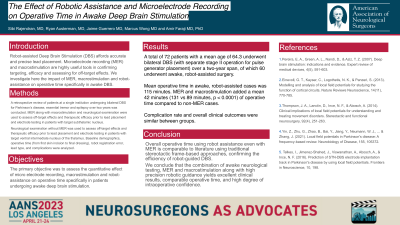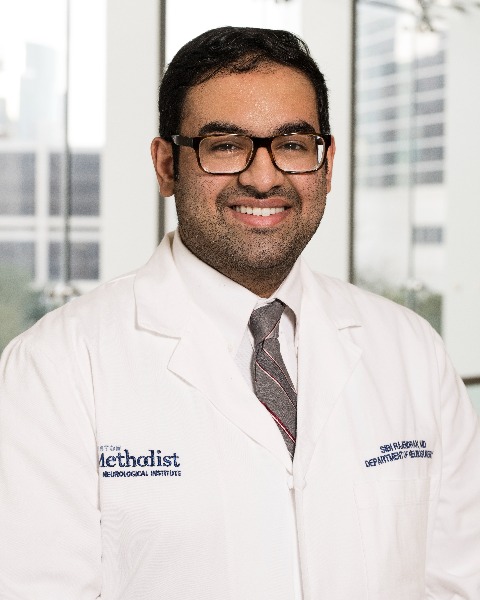The Effect of Robotic Assistance and Microelectrode Recording on Operative Time in Awake Deep Brain Stimulation
Friday, April 21, 2023


Sibi Rajendran, MD
Resident Physician, Neurosurgery
Houston Methodist Hospital
Houston, Texas, United States
ePoster Presenter(s)
Introduction: Robot-assisted Deep Brain Stimulation (DBS) affords accurate and precise lead placement. Microelectrode recording (MER) and macrostimulation are highly useful tools in confirming targeting, efficacy and assessing for off-target effects. We discuss the impact of MER, macrostimulation and robot-assistance on operative time in awake DBS.
Methods: A retrospective review of patients at a single institution undergoing bilateral DBS for Parkinson’s disease, essential tremor and epilepsy over two years was conducted. MER along with macrostimulation and neurological examination were used to assess off-target effects and therapeutic efficacy prior to lead placement and electrode testing in patients with target subthalamic nucleus. Neurological examination without MER was used to assess off-target effects and therapeutic efficacy prior to lead placement and electrode testing in patients with target ventral intermediate nucleus of the thalamus. Baseline demographics, operative time (from first skin incision to final dressing), robot registration error, lead type, and complications were analyzed.
Results: 72 patients (mean age 64.3) underwent bilateral DBS (with separate stage II operation for pulse generator placement) over a two-year span, of which 60 underwent awake, robot-assisted surgery. Mean operative time in awake, robot-assisted cases was 115 minutes. MER and macrostimulation added a mean 42 minutes (131 vs 89 minutes, p < 0.0001) of operative time compared to non-MER cases. Complication rate and overall clinical outcomes were similar between groups.
Conclusion : MER and macrostimulation in this study on average added 42 minutes more of operative time compared to awake, robotic surgery without MER. Our overall operative time using robot assistance even with MER is comparable to literature using traditional stereotactic frame-based approaches, confirming the efficiency of robot-guided DBS. We conclude that the combination of awake neurological testing, MER and macrostimulation along with high precision robotic guidance yields excellent clinical results, comparable operative time, and high degree of intraoperative confidence.
Methods: A retrospective review of patients at a single institution undergoing bilateral DBS for Parkinson’s disease, essential tremor and epilepsy over two years was conducted. MER along with macrostimulation and neurological examination were used to assess off-target effects and therapeutic efficacy prior to lead placement and electrode testing in patients with target subthalamic nucleus. Neurological examination without MER was used to assess off-target effects and therapeutic efficacy prior to lead placement and electrode testing in patients with target ventral intermediate nucleus of the thalamus. Baseline demographics, operative time (from first skin incision to final dressing), robot registration error, lead type, and complications were analyzed.
Results: 72 patients (mean age 64.3) underwent bilateral DBS (with separate stage II operation for pulse generator placement) over a two-year span, of which 60 underwent awake, robot-assisted surgery. Mean operative time in awake, robot-assisted cases was 115 minutes. MER and macrostimulation added a mean 42 minutes (131 vs 89 minutes, p < 0.0001) of operative time compared to non-MER cases. Complication rate and overall clinical outcomes were similar between groups.
Conclusion : MER and macrostimulation in this study on average added 42 minutes more of operative time compared to awake, robotic surgery without MER. Our overall operative time using robot assistance even with MER is comparable to literature using traditional stereotactic frame-based approaches, confirming the efficiency of robot-guided DBS. We conclude that the combination of awake neurological testing, MER and macrostimulation along with high precision robotic guidance yields excellent clinical results, comparable operative time, and high degree of intraoperative confidence.
